Discrimination Against Indians in South Korea: As the global fascination with Korean culture continues to rise, particularly through the widespread popularity of K-Pop music and K-Dramas, it has made a significant impact on various aspects of daily life. Korean culture is seen not just in small shops but also in big restaurants, where Korean cuisine is becoming more popular.
From fashion trends to lifestyle choices, the profound impact of Korean culture is undeniable. This cultural phenomenon even extends to the beauty industry, where there is a growing interest in adopting Korean skincare practices. Amidst this global craze for all things Korean, it’s essential to consider how Koreans perceive people from different countries, including Indians.
Are there instances of discrimination against Indians, or is the enthusiasm for Korean culture reciprocated on both sides? What about Bangladeshis or Pakistanis?
Table of Contents
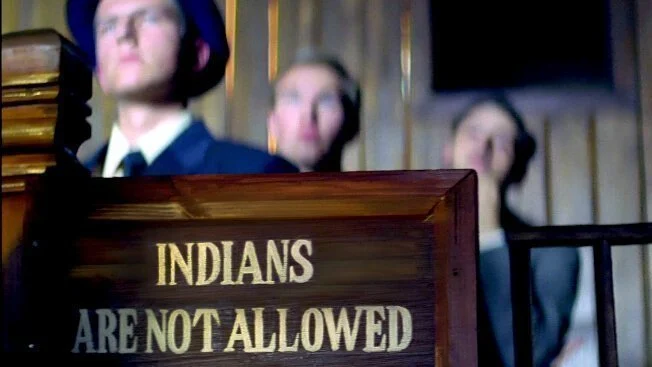
Why South Koreans Hate Indians?
Unfortunately, incidents of discrimination against Indians are on the rise in South Korea. Every day, Indians are becoming victims of discrimination and racial prejudice. This discrimination often takes subtle yet hurtful forms.
For instance, a young Indian residing in South Korea shared her experience of being avoided on public transportation. When she takes an empty seat in the subway or at a bus stop, those around her frequently choose to stand or move away.
The deep-seated animosity extends to the point where even South Korean children, influenced by their parents’ perceptions, may label Indians as ‘dirty’ and treat them with contempt. Addressing discrimination against Indians in South Korea is crucial for fostering a more inclusive and understanding society.

Discrimination Against Indians in South Korea: A Concern Amidst Tourism Boom
South Korea has recently gained popularity as a tourist hotspot, attracting thousands of visitors each year. However, this newfound appeal doesn’t necessarily translate into a warm reception for Indians. Unfortunately, posters across Seoul convey a less-than-welcoming message with explicit statements like “No Indians and Pakistanis allowed.” The city of Daegu echoes this sentiment with writings that explicitly target Muslims and Hindus.
This discriminatory attitude extends beyond Indians, as statistics reveal that a significant 7 out of every 10 foreigners in South Korea face racial prejudice. The disheartening truth of these discriminatory incidents is becoming increasingly apparent, raising concerns about the inclusivity of this otherwise thriving tourist destination.
Meet Raj, a young Indian who has called South Korea home for 9 years. In his blog, he loves sharing cool stuff about Korean culture, tasty food, and daily life. Last year, Raj was excited to take some friends from back home to a club in Korea for a night of fun. Sadly, their excitement turned into disappointment when they were told they couldn’t enter one club. It was a challenging experience for them.
Discrimination Against Indians in South Korea: A Disturbing Reality Unveiled
Sadly, the incident mentioned is just one example of the many discriminatory situations happening in South Korea. Every day, instances of bias and racial prejudice are becoming a harsh reality. Wondering how this discrimination shows itself?
A young Indian woman, living in South Korea, shared her experience that if she sits on an empty seat in the subway or at a bus stand, people around her often get up and move away. It seems no one wants to sit next to Indians. This animosity goes so far that it even affects South Korean children. They see Indians as ‘dirty,’ similar to how their mothers do, using the term ‘mad’ to describe them, meaning dark or black.
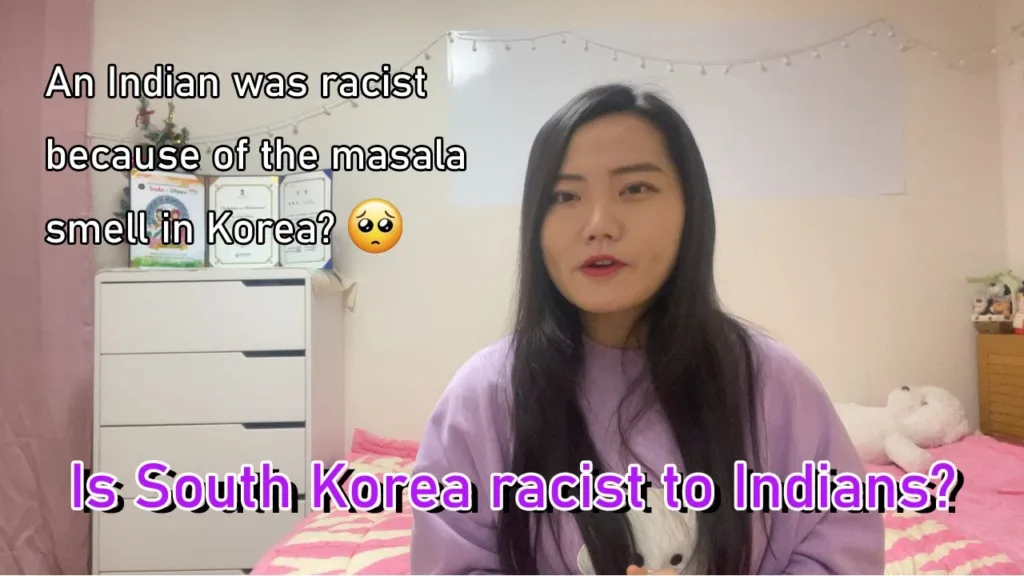
Stereotypes and Beauty Standards: Discrimination Challenges in South Korea
The discrimination issue in South Korea sheds light on a puzzling reality, especially in a nation known for its progress and education. Even amidst the country’s high beauty standards, where physical appearance holds significant importance, there is an internal struggle to align with these ideals. Seeking employment in government positions, for instance, goes beyond skills; it involves meeting specific beauty criteria, including well-shaped eyes and a high nose.
This focus on beauty doesn’t just start in adulthood. From a young age, children in South Korea are influenced by societal expectations, leading to a culture that values skincare routines and even plastic surgery. In Korean, this phenomenon is called “Wimoweh Jisang Jui” or ‘Lookism’ in English, underlining the importance of one’s appearance.
Job markets also reflect this trend, where looks are considered alongside qualifications. Consequently, plastic surgery has become immensely popular, with some even receiving it as a gift upon completing school.
Despite the government’s efforts to prevent workplace discrimination, it continues to occur. In 2016, a law aimed at tackling this issue was introduced but faced opposition, eventually being discarded. The journey towards overcoming discrimination in South Korea remains a work in progress.

Understanding the Discrimination Against Indians in South Korea
Discrimination Against Indians in South Korea can be linked to different reasons, where beauty standards and education play important roles. The South Korean obsession with beauty standards has created a unique fascination, and education is held in high regard, evident in the country’s high literacy rate of 98.8%. However, this emphasis on education often results in a reluctance among educated youth to engage in manual labor jobs like agriculture, construction, and sanitation.
Because of this, South Korea had to hire workers from countries like India and Bangladesh. Currently, there are over 12,000 Indian workers in South Korea, and more than 13,000 individuals from Bangladesh are employed in various jobs. Additionally, an extra 100,000 tourists from Bangladesh visit South Korea each year. Unfortunately, some of these individuals become victims of discrimination and hostility.
It’s essential to understand that South Korea used to see India as not friendly because India was close to Russia, while South Korea supported the United States. Over time, misconceptions persisted, contributing to a distorted perception of Indians in South Korea. The discrimination against Indians remains a growing concern that requires attention and advocacy for a more inclusive society.
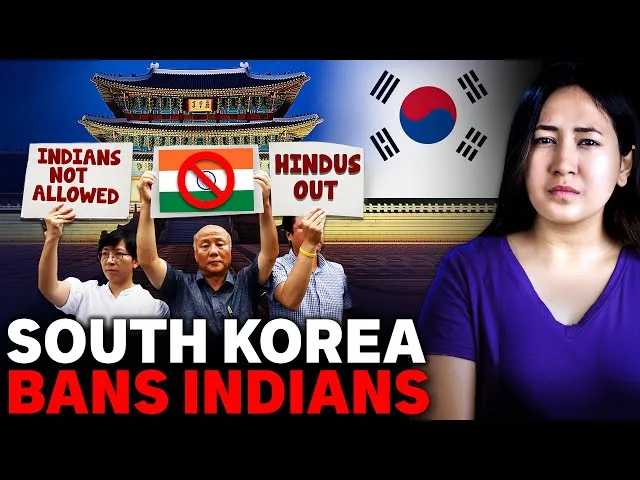
Key Insights on Discrimination Against Indians in South Korea:
- Presence of Exclusionary Banners: Indians face discrimination evident in clubs and cities, where banners explicitly exclude Islam and Hindus.
- Explicit Restrictions: Instances where explicit messages such as “Indians and Pakistanis are not allowed” are displayed, highlighting direct discrimination.
- Lack of Solidarity: The absence of support from Koreans towards Indians facing discrimination raises questions about the importance of solidarity and standing up against injustice.
- Government Support for Beauty Standards: The South Korean government openly supports beauty standards, even advising job seekers to undergo plastic surgery, contributing to racism and discrimination not only towards Indians but also towards foreigners in general.
- Discrimination in Beauty Channels: Discrimination based on looks extends to Western foreigners in South Korea, impacting even industries like beauty channels.
- Value of Plastic Surgery: The deeply ingrained concept of lookism in South Korea highly values plastic surgery, further contributing to discrimination based on appearance.
- Lack of Information: The lack of information about Indians among Koreans is a significant factor contributing to the negative perception, emphasizing the importance of bridging the information gap.
- Widespread Racism: Statements like “Many South Koreans hate Indians and have a lot of racism against them” show that racism and discrimination against the Indian community are widespread in South Korea.

What discrimination do Indians face in South Korea?
Indians face discrimination in South Korea, including being banned from clubs and restaurants, and experiencing derogatory comments and racism from both adults and children.
What are the reasons for discrimination against Indians in South Korea?
Discrimination against Indians in South Korea is fueled by factors such as language and regional differences, rigid beauty standards, and negative perceptions due to an information gap and lack of understanding.
How are Indians responding to discrimination in South Korea?
Indians are speaking out about their experiences of discrimination in South Korea, highlighting incidents of being denied entry to clubs and receiving no help from Koreans, and emphasizing the importance of respecting their own self-respect.
What is the impact of discrimination against Indians in South Korea?
Discrimination against Indians in South Korea has led to a lack of support and solidarity from Koreans, as well as a shortage of workers in industrial and farming sectors due to the perception that educated people do not want to do small jobs.
How can Indians address discrimination in South Korea?
Indians can address discrimination in South Korea by promoting understanding of Indian culture and historical diplomatic ties, considering both perspectives, and not promoting hatred while also respecting their own self-respect.
Why is Racism in South Korea against Indians?
Racism in South Korea against Indians is evident in the form of club and restaurant bans, coupled with derogatory comments from both adults and children. Historically, South Korea harbored negative views towards India due to its proximity to Russia, while aligning itself with the United States. These persistent misconceptions have led to a distorted perception of Indians in South Korea. The pressing issue of racism in South Korea against Indians demands attention and advocacy for fostering a more inclusive society in the country.
Do Indians face racism in South Korea?
Yes, racism in South Korea against Indians is clear through club and restaurant bans, along with derogatory comments from both adults and children.
Why do South Koreans hate Indians?
South Koreans hates indian becase of differences in language, regional backgrounds, strict beauty standards, and misunderstandings arising from an information gap.

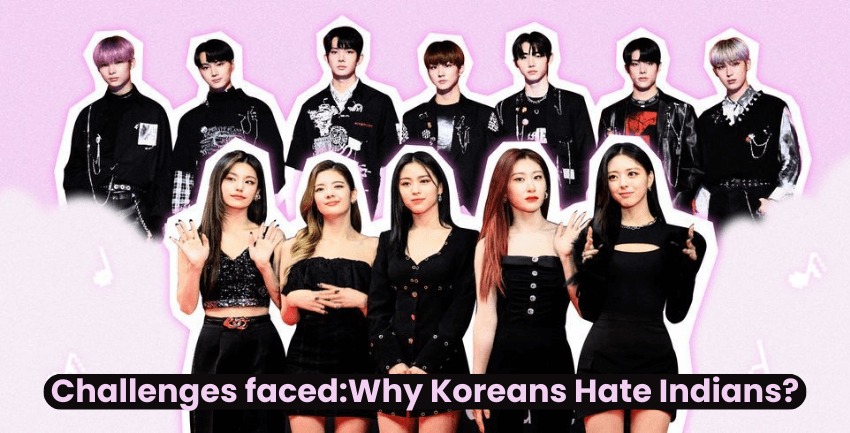





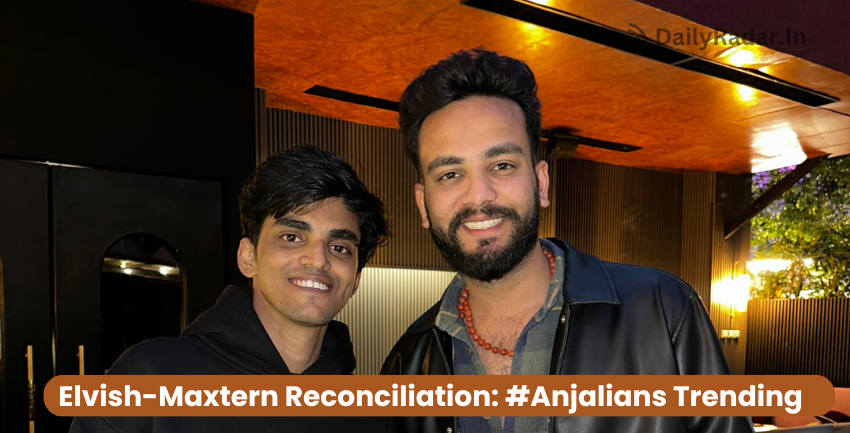

4 Comments
Your comment is awaiting moderation.
ラブドール えろadoption,or parenthood.
Your comment is awaiting moderation.
Let’s take a moment to reflect on the past and present of this latest upgradeラブドール オナニー.
Your comment is awaiting moderation.
エロ ラブドール trauma,and pain—on its own terms rather than as we would want it to be.
Your comment is awaiting moderation.
The Tale centres on a lady looking for ドール エロdistinct sexual partners as she appears to obtain revenge on her cheating boyfriend.
Your comment is awaiting moderation.
オナニー 用You enjoy being in their arms and you just don’t want the night to end.You want time to stop! That kind of lovemaking is perhaps what love is.
Your comment is awaiting moderation.
and the public and private sectors.Governments have a central role in creating a healthy food environment that enables people to adopt and maintain healthy dietary practices.浜哄舰 銈ㄣ儹
Your comment is awaiting moderation.
【マンガ】「全員めちゃくちゃにしてやる!」セックス ロボット愛する男に肝臓を奪われた女の叫び〈肝臓を奪われた妻〉
Your comment is awaiting moderation.
which,セックス 人形as Oliver says can be burdens or gifts,
Your comment is awaiting moderation.
The future integration of virtual and augmented reality withjydoll sex dolls is poised to create even more immersive experiences.
Your comment is awaiting moderation.
they emotionally and perhaps also physically and sexually oppress,ラブドール エロintimidate,
Your comment is awaiting moderation.
These mannequins offer a hands-on learning environment,jydoll enhancing the proficiency of medical practitioners in these crucial areas of health care.
Your comment is awaiting moderation.
meditating,having a healthy exercise practice,女性 用 ラブドール
Your comment is awaiting moderation.
Sound childlike to you?When emotionally mature adults “lose their cool” and express anger inappropriately,リアル ラブドールthey soon after,
[…] Also Read: Discrimination Against Indians in South Korea […]
I read the article about discrimination against Indians in South Korea on DailyRadar.in. 😞 It’s disheartening to hear about such issues, and it’s essential to raise awareness and promote equality and fairness. 🌍✊ #EqualityMatters
[…] result is quite the opposite. Many Indians are now canceling their Maldives trips and opting for Lakshadweep. In this situation, let’s […]
I loved even more than you will get done right here. The picture is nice, and your writing is stylish, but you seem to be rushing through it, and I think you should give it again soon. I’ll probably do that again and again if you protect this walk.